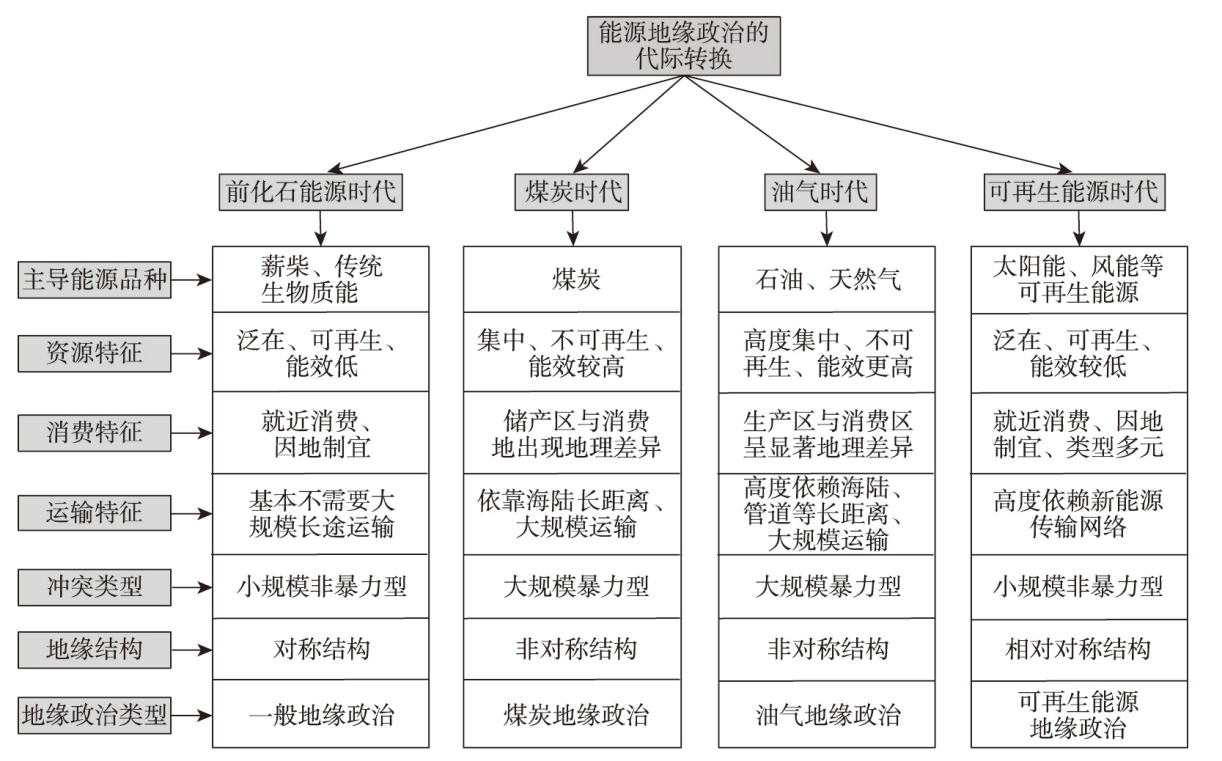

Energy transition reshapes geopolitics: Logic and research frontiers
Received date: 2023-02-08
Revised date: 2023-08-13
Online published: 2023-09-28
Supported by
Special Fund of the National Natural Science Foundation of China(72348003)
Excellent Young Scientists Fund of the National Natural Science Foundation of China(42022007)
The transition from fossil energy to renewable energy will change the structure of global energy geopolitical power structure, national relations, and the driving factors of geopolitical game, which will have a far-reaching impact on the geopolitical shaped by fossil energy. On the basis of combing the origin of energy and geopolitics, this paper expounds the internal logic of the energy transition to reconfigure geopolitics and provides an outlook on the geopolitics of the energy transition. The conclusions are as follows: (1) The connotation and attributes of energy, as well as the differences between energy and geopolitics, determine that energy geopolitics presents significant intergenerational transformation characteristics. (2) The competition for key minerals, the game of low-carbon technology, the reconstruction of geopolitical pattern and the global energy governance are the four dimensions of the geopolitics of energy transformation reconstruction, of which the competition for key minerals is the basis of the geopolitical game of energy transformation, the game of low-carbon technology is the new focus of the geopolitics of energy transformation, and the reconstruction of geopolitical pattern is the direct characterization of the geopolitics of energy transition, energy governance is the path to ease the geopolitical game of energy transformation. (3) In the process of energy transformation and reconstruction of geopolitics, the competition for key minerals, the game of low-carbon technology, the reconstruction of geopolitical pattern and global energy governance are interrelated and interacted, which aggravates the complexity and uncertainty of energy geopolitics in the era of renewable energy. (4) Looking forward to the future, to better promote the development of energy geography and serve the major strategic needs of national energy security, the geopolitical research of energy transformation urgently needs to strengthen the theoretical innovation of energy transition reshaping geopolitics, promote the quantitative research of the geopolitical impact of energy transformation, construct the path of China's deep participation in global energy governance, and pay attention to the energy security issues caused by energy transformation under the background of "carbon neutrality".

YANG Yu , XIA Siyou , JIN Zhijun . Energy transition reshapes geopolitics: Logic and research frontiers[J]. Acta Geographica Sinica, 2023 , 78(9) : 2299 -2315 . DOI: 10.11821/dlxb202309012
| [1] |
[杨宇, 于宏源, 鲁刚, 等. 世界能源百年变局与国家能源安全. 自然资源学报, 2020, 35(11): 2803-2820.]
|
| [2] |
[邹才能, 何东博, 贾成业, 等. 世界能源转型内涵、路径及其对碳中和的意义. 石油学报, 2021, 42(2): 233-247.]
|
| [3] |
[张锐. 能源转型的政治学研究:基于德国弃煤的探讨. 德国研究, 2020, 35(4): 20-38, 186-187.]
|
| [4] |
[杨宇. 中国与全球能源网络的互动逻辑与格局转变. 地理学报, 2022, 77(2): 295-314.]
|
| [5] |
|
| [6] |
IRENA. A new world: The geopolitics of the energy transformation. Global Commission on the Geopolitics of Energy Transformation, 2019.
|
| [7] |
[杨宇, 刘承良, 崔守军. “百年变局、能源风云、世界眼光、家国情怀”: “世界能源地理与国家安全”专辑发刊词. 自然资源学报, 2020, 35(11): 2569-2571.]
|
| [8] |
[何则. 国际能源网络的权力、结构组织与演化机制研究[D]. 北京: 中国科学院大学, 2021.]
|
| [9] |
|
| [10] |
National Science Foundation, NASA Solar Energy Panel. An assessment of solar energy as a national energy resource. University of Maryland, 1972. https://ntrs.nasa.gov/archive/nasa/casi.ntrs.nasa.gov/19730018091.
|
| [11] |
California Academy of Sciences. Dispersed, decentralized and renewable energy sources: Alternatives to national vulnerability and war. 1980.
|
| [12] |
|
| [13] |
|
| [14] |
|
| [15] |
|
| [16] |
|
| [17] |
|
| [18] |
|
| [19] |
|
| [20] |
|
| [21] |
|
| [22] |
|
| [23] |
|
| [24] |
|
| [25] |
|
| [26] |
|
| [27] |
|
| [28] |
|
| [29] |
|
| [30] |
|
| [31] |
|
| [32] |
|
| [33] |
|
| [34] |
|
| [35] |
|
| [36] |
[吴磊. 新能源发展对能源转型及地缘政治的影响. 太平洋学报, 2021, 29(1): 62-70.]
|
| [37] |
[苗中泉, 毛吉康. 电能时代的能源地缘政治初探. 全球能源互联网, 2020, 3(5): 518-525.]
|
| [38] |
[张所续. 浅析能源转型对地缘政治的影响. 国土资源情报, 2019(8): 26-33.]
|
| [39] |
[杨宇. 论地缘能权. 自然资源学报, 2020, 35(11): 2572-2584.]
|
| [40] |
[杨宇, 何则. 能源地缘政治与能源权力研究. 地理科学进展, 2021, 40(3): 524-540.]
|
| [41] |
[崔守军, 蔡宇, 姜墨骞. 重大技术变革与能源地缘政治转型. 自然资源学报, 2020, 35(11): 2585-2595.]
|
| [42] |
[赵宏图. 碳中和与国际能源政治新变局. 现代国际关系, 2022(2): 29-37, 64, 63.]
|
| [43] |
[杨宇, 夏四友, 钱肖颖. 能源转型的地缘政治研究. 地理学报, 2022, 77(8): 2050-2066.]
|
| [44] |
[王亚栋. 能源与国际政治[D]. 北京: 中共中央党校, 2002.]
|
| [45] |
IEA. Net zero by 2050: A roadmap for the global energy sector. https://www.iea.org/events/net-zero-by-2050-a-roadmap-for-the-global-energy-system.
|
| [46] |
|
| [47] |
IEA. The Role of Critical Minerals in Clean Energy Transitions. https://iea.blob.cor.windows.net/assets/24d5dfbb-a77a-4647-abcc-667867207f74/The Role of Critical Mineralsin Clean Energy Transitions.pdf.
|
| [48] |
International Energy Agency. Clean Energy Progress after the Covid-19 Crisis Will Need Reliable Supplies of Critical Minerals. Paris: International Energy Agency, 2020.
|
| [49] |
|
| [50] |
|
| [51] |
|
| [52] |
[董雪松, 黄健柏, 钟美瑞, 等. 技术进步对关键金属矿产需求影响的研究综述. 资源科学, 2020, 42(8): 1592-1603.]
|
| [53] |
[汪鹏, 王翘楚, 韩茹茹, 等. 全球关键金属—低碳能源关联研究综述及其启示. 资源科学, 2021, 43(4): 669-681.]
|
| [54] |
[崔守军. 全球清洁能源转型与中国技术标准话语权建构. 人民论坛, 2022(9): 50-54.]
|
| [55] |
|
| [56] |
[吴巧生, 周娜, 成金华. 战略性关键矿产资源供给安全研究综述与展望. 资源科学, 2020, 42(8): 1439-1451.]
|
| [57] |
|
| [58] |
|
| [59] |
|
| [60] |
|
| [61] |
|
| [62] |
[于宏源. 地缘政治与全球市场: 全球资源治理的两种逻辑. 欧洲研究, 2021, 39(1): 102-122, 7.]
|
| [63] |
|
| [64] |
|
| [65] |
|
| [66] |
|
| [67] |
|
| [68] |
[杨宇, 何则. 中国海外油气依存的现状、地缘风险与应对策略. 资源科学, 2020, 42(8): 1614-1629.]
|
| [69] |
[何则, 周彦楠, 刘毅. 2050年中国能源消费结构的系统动力学模拟: 基于重点行业的转型情景. 自然资源学报, 2020, 35(11): 2696-2707.]
|
| [70] |
[张锐, 相均泳. “碳中和”与世界地缘政治重构. 国际展望, 2021, 13(4): 112-133, 156-157.]
|
| [71] |
[王文涛, 刘燕华, 于宏源. 全球气候变化与能源安全的地缘政治. 地理学报, 2014, 69(9): 1259-1267.]
|
| [72] |
[刘东生. 全球变化和可持续发展科学. 地学前缘, 2002, 9(1): 1-9.]
|
/
| 〈 |
|
〉 |